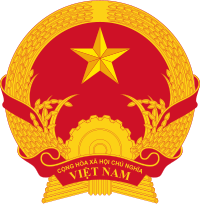
Back سياسة فيتنام Arabic Държавно устройство на Виетнам Bulgarian ভিয়েতনাম#রাজনীতি Bengali/Bangla Política de Vietnam Spanish سیاست ویتنام FA Vietnamin politiikka Finnish Politique au Viêt Nam French 베트남의 정치 Korean Politik Vietnam Malay Ustrój polityczny Wietnamu Polish
Politics of Vietnam Chính trị Việt Nam | |
|---|---|
 | |
| Polity type | Unitary Marxist-Leninist one-party socialist republic |
| Constitution | Constitution of Vietnam |
| Legislative branch | |
| Name | National Assembly |
| Type | Unicameral |
| Meeting place | National Assembly Building of Vietnam |
| Presiding officer | Trần Thanh Mẫn, Chairman of the National Assembly. |
| Executive branch | |
| Supreme leader | |
| Title | General Secretary |
| Currently | Tô Lâm |
| Appointer | Central Committee |
| Head of state | |
| Title | President |
| Currently | Lương Cường |
| Appointer | National Assembly |
| Head of government | |
| Title | Prime Minister |
| Currently | Phạm Minh Chính |
| Appointer | National Assembly |
| Cabinet | |
| Name | Government of Vietnam |
| Current cabinet | Chính government |
| Leader | Prime Minister |
| Deputy leader | First Deputy Prime Minister |
| Appointer | National Assembly |
| Headquarters | Presidential Palace |
| Ministries | 18 |
| Judicial branch | |
| Name | Judicial system |
| Supreme People's Court | |
| Chief judge | Nguyễn Hòa Bình |
| Supreme People's Procuracy | |
| Chief judge | Lê Minh Trí |
 |
|---|
|
|
The politics of Vietnam is dominated by a single party under an authoritarian system, the Communist Party of Vietnam (CPV). The President of Vietnam (Vietnamese: Chủ tịch nước) is the head of state, and the Prime Minister of Vietnam is the head of government. Both of these offices are separate from the General Secretary of the Communist Party of Vietnam, who leads the CPV and is head of the Politburo and the Central Military Commission. The General Secretary is thus the de facto highest position in the Vietnamese politics.
Executive power is exercised by the government and the President of Vietnam. Legislative power is vested in the National Assembly of Vietnam (Quốc hội Việt Nam). The Judiciary is independent of the executive. The parliament adopted the current Constitution of Vietnam, Vietnam's fifth, on 28 November 2013.
After 1986 Vietnam reduced its totalitarian government to an authoritarian one and has inherited many legacies of the past, with the freedom of assembly, association, expression, press and religion as well as civil society activism being tightly restricted.[1][2] There are no freely elected national leaders, political opposition is suppressed, all religious activity is controlled by the CPV, dissent is not permitted, and civil rights are curtailed. Elections in Vietnam occur under a single-party authoritarian political system. Vietnam is among the few contemporary party-led dictatorships to not hold any direct multiparty elections at the national level. The competitive nature of the elections is highly constrained by the Communist Party's monopoly on power in Vietnam, limitations on free speech, and government interference with the elections.[3]
The National Assembly is a rubber stamp unicameral legislative body. The National Assembly has 500 members, indirectly elected by popular vote to serve four-year terms. The legislature is, according to the constitution, the highest organ of the state. Its powers includes the enactment and amendment of the constitution and laws; the adoption of the government budget; supervising the Government of Vietnam and other holders of public powers responsible to the National Assembly; and appointing members of the judiciary. The Vietnamese constitution and legislation provides for regular elections for the office of the President of the Socialist Republic, the National Assembly and the People's Councils.
The President is elected by National Assembly for a five-year term and acts as the de jure commander-in-chief of the Vietnam People's Armed Forces and Chairman of the Council for Defence and Security. However, the president has the right to decide on executive brands. The government (Chính phủ), the main executive state power of Vietnam, is headed by the Prime Minister, who has several Deputy Prime Ministers and several ministers in charge of particular activities. The executive branch is responsible for the implementation of political, economic, cultural, social, national defence, security and external activities of the state.
Vietnam has a judicial system governed by the Constitution of Vietnam and national legislation enacted by National Assembly. The Supreme People's Court (Tòa án Nhân dân Tối cao) is the highest court of appeal in Vietnam. There are other specialised courts in Vietnam, including the Central Military Court, the Criminal Court, the Civil Court and the Appeal Court. The Supreme People's Procuracy observes the implementation of state organs and makes sure that Vietnamese citizens follow the law.[4]
- ^ Morris, Stephen J. (1 May 2005). "The War We Could Have Won". The New York Times. Retrieved 11 December 2024.
- ^ Nguyen, Thuy (2022). "Exploiting Ideology and Making Higher Education Serve Vietnam's Authoritarian Regime". Communist and Post-Communist Studies. 55 (4): 83–104. doi:10.1525/cpcs.2022.1819231.
- ^ "Vietnam" (PDF). state.gov. U.S. State Department. Retrieved 10 June 2022.
- ^ "CONSTITUTION AND POLITICAL SYSTEM". Embassy of the Socialist Republic of Vietnam in the United States of America.